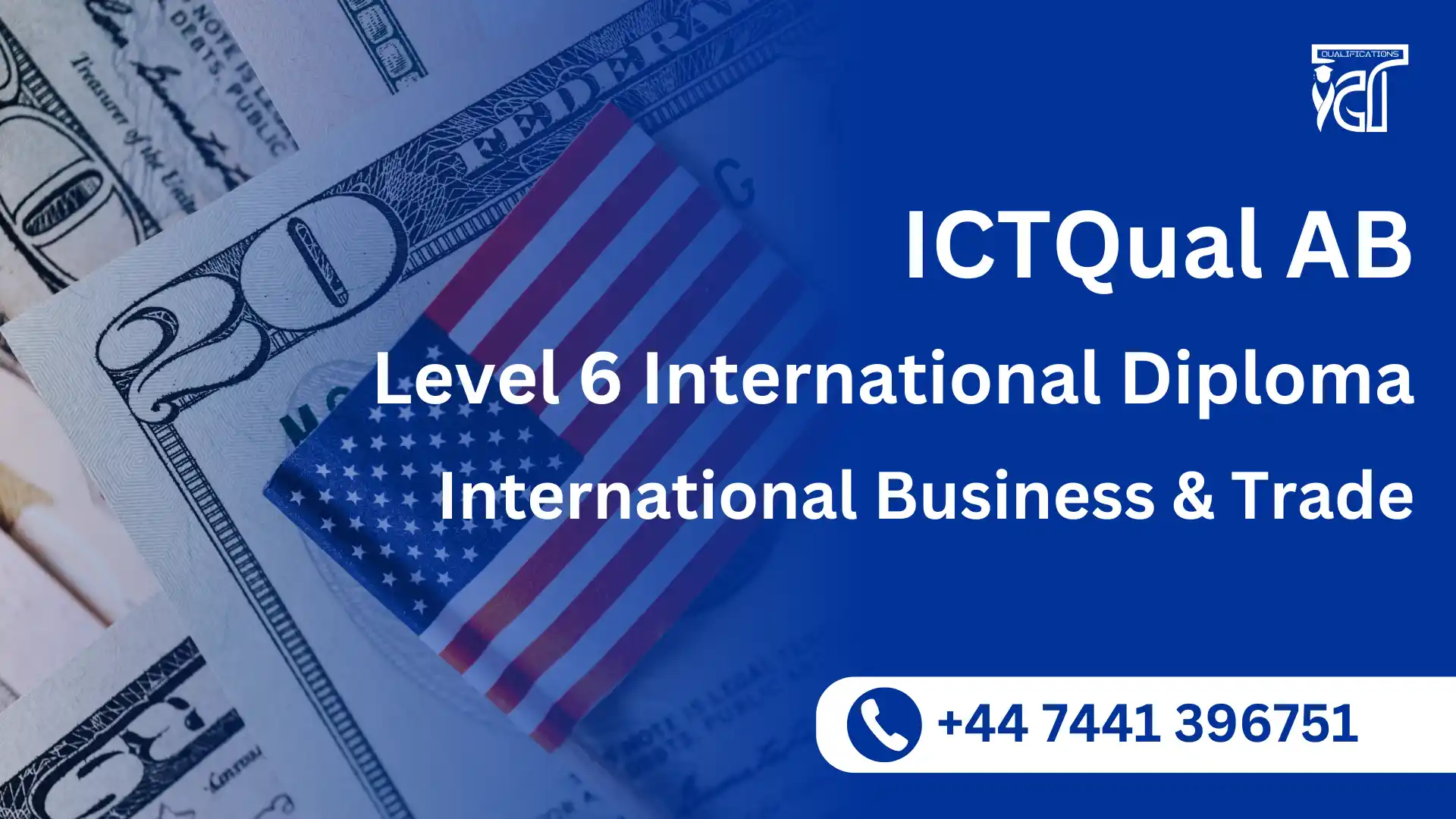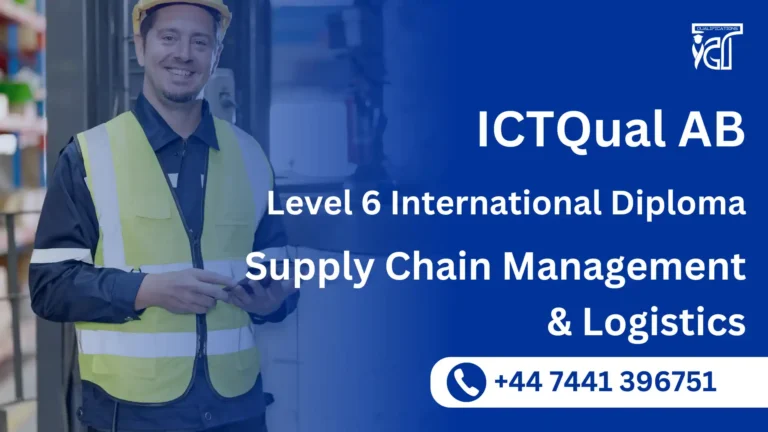The ICTQual AB Level 6 International Diploma in International Business and Trade is a globally recognised programme designed to prepare learners for the dynamic world of international business, global trade, and cross-border commerce. Delivered over three years with a comprehensive 360-credit structure, ICTQual AB Level 6 International Diploma in International Business and Trade offers professional value and industry relevance for learners who want to build or advance their careers in global markets.
Whether you are a fresher aiming to establish a strong foundation or an experienced professional seeking career growth, ICTQual AB Level 6 International Diploma in International Business and Trade equips you with the skills, knowledge, and confidence to excel. Learners will explore essential topics such as international trade management, export-import operations, global business strategy, financial planning, and cross-cultural leadership, gaining the practical expertise needed to make impactful decisions in diverse business environments.
Graduates of this diploma will develop highly sought-after abilities, including market analysis, international marketing, supply chain optimisation, and strategic planning, positioning them for success in competitive industries. These skills open doors to career opportunities in multinational corporations, trade consultancy, export-import management, and global business development.
By completing ICTQual AB Level 6 International Diploma in International Business and Trade, learners gain more than just a qualification—they acquire the credibility, advanced competencies, and global perspective needed to thrive in international business and trade. ICTQual AB Level 6 International Diploma in International Business and Trade comprehensive approach ensures graduates are prepared to meet evolving industry demands, lead in multicultural settings, and make a meaningful impact in the global economy.
ICTQual AB Level 6 International Diploma in International Business and Trade is ideal for learners seeking career advancement, international exposure, and practical skills that align with evolving industry demands.ICTQual AB Level 6 International Diploma in International Business and Trade global relevance ensures that learners are fully equipped to succeed in cross-border commerce, international trade, and strategic business management, making it a transformative step in their professional journey.
ICTQual ABLevel 6 International Diploma in International Business and Trade
This qualification, the ICTQual AB Level 6 International Diploma in International Business and Trade, consists of 36 mandatory units.
Year 1 – Core Foundations in International Business
- Principles of International Business and Trade
- Fundamentals of Global Economics
- Business Law and International Regulatory Frameworks
- Introduction to Marketing in a Global Context
- Organisational Behaviour and Management Principles
- Business Accounting and Financial Reporting
- Supply Chain and Logistics Management Basics
- Business Data Analysis and Research Skills
- International Business Communication and Negotiation
- Information Technology for Business Operations
- Professional Skills for Global Business Careers
- Corporate Social Responsibility and Sustainability Fundamentals
Year 2 – Applied International Business Practices
- International Trade Law, Tariffs, and Policy
- Strategic Marketing for International Markets
- International Banking and Financial Systems
- Cross-Cultural Leadership and Management
- Global Human Resource Management
- Operations and Supply Chain in Global Business
- International Risk Management and Compliance
- Political Economy and International Trade Relations
- Business Analytics for Decision-Making
- Digital Trade and E-Commerce Innovation
- Project and Programme Management in Business
- Ethics, Governance, and Sustainability in International Trade
Year 3 – Advanced Global Business Strategy and Leadership
- Strategic Management in International Business
- Advanced International Trade Theories and Practices
- Global Finance, Investment, and Capital Markets
- Leadership, Change, and Organisational Transformation
- International Entrepreneurship and Innovation
- Trade Diplomacy, International Negotiations, and Policy-Making
- Emerging Markets and Global Business Opportunities
- Crisis and Risk Management in Global Business
- Advanced Research Methods for International Business
- Dissertation / Final Research Project in International Business and Trade
- Global Business Strategy and Competitive Advantage
- Future Trends in International Business, Technology, and Trade
Learning Outcomes for the ICTQual AB Level 6 International Diploma in International Business and Trade:
Year 1 – Core Foundations in International Business
1. Principles of International Business and Trade
- Explain the nature, scope, and driving forces of International Business and Trade and globalisation, including technological advancement, trade liberalisation, and international competitiveness.
- Critically analyse the contribution of international trade to global and regional economic development, identifying both opportunities and challenges for businesses.
- Apply key trade concepts, including imports, exports, tariffs, and trade balances, to practical business scenarios, demonstrating awareness of international markets.
2. Fundamentals of Global Economics
- Demonstrate an in-depth understanding of fundamental microeconomic and macroeconomic principles, particularly in the context of global business operations.
- Evaluate the effects of fiscal and monetary policies on international markets, exchange rates, and foreign investment flows.
- Interpret and analyse economic indicators (GDP, inflation, unemployment, trade balance, FDI inflows) to assess the performance and prospects of global economies.
3. Business Law and International Regulatory Frameworks
- Describe the foundations of business and Trade law and its role in regulating international trade and protecting stakeholder interests.
- Apply principles of contracts, corporate law, and intellectual property rights to practical case studies involving multinational businesses.
- Analyse the implications of diverse legal systems, trade agreements, and compliance regulations on global business operations.
4. Introduction to Marketing in a Global Context
- Define core marketing principles and critically assess how they adapt to international markets with cultural, social, and economic differences.
- Identify and evaluate global market entry strategies, customer segmentation techniques, and international positioning methods.
- Apply the marketing mix (4Ps/7Ps) to develop tailored strategies suitable for cross-border environments and diverse consumer needs.
5. Organisational Behaviour and Management Principles
- Explain key theories of organisational behaviour and management and assess their relevance in multicultural business environments.
- Analyse leadership styles, motivational theories, and management approaches, evaluating their impact on workplace culture and productivity.
- Apply motivational and team-building strategies to improve collaboration, innovation, and performance in diverse organisations.
6. Business Accounting and Financial Reporting
- Understand the principles of accounting, including double-entry bookkeeping, accruals, and the conceptual framework of financial reporting.
- Prepare, interpret, and evaluate key financial statements such as the income statement, balance sheet, and cash flow statement.
- Apply accounting and financial principles to support decision-making and performance analysis in international businesses.
7. Supply Chain and Logistics Management Basics
- Explain the structure, role, and importance of supply chains and logistics in supporting international trade.
- Identify and analyse key processes that enhance efficiency, including procurement, transportation, warehousing, and distribution.
- Evaluate challenges and risks in global supply networks, including geopolitical issues, currency fluctuations, and sustainability concerns.
8. Business Data Analysis and Research Skills
- Demonstrate understanding of qualitative and quantitative research methods applicable to business and trade studies.
- Apply statistical tools, data analysis techniques, and research frameworks to evaluate business trends and patterns.
- Present findings in clear, professional formats, ensuring data-driven insights support informed business decision-making.
9. International Business Communication and Negotiation
- Apply advanced communication techniques in verbal, written, and digital contexts, tailored to international business environments.
- Demonstrate negotiation strategies that address cultural sensitivities, conflict resolution, and mutual benefit in global partnerships.
- Analyse barriers to communication, such as cultural differences or language limitations, and propose practical solutions.
10. Information Technology for Business Operations
- Explain the strategic role of IT in supporting organisational performance, global connectivity, and digital transformation.
- Demonstrate competency in using digital tools for research, professional communication, data management, and collaboration.
- Apply IT-driven solutions to enhance efficiency and innovation in international business operations.
11. Professional Skills for Global Business Careers
- Develop and demonstrate workplace readiness skills, including teamwork, adaptability, time management, and critical thinking.
- Exhibit professional behaviour, ethics, and accountability in business environments across cultural and international settings.
- Create and maintain personal and professional development plans aligned with long-term career goals in international trade and business.
12. Corporate Social Responsibility and Sustainability Fundamentals
- Define and explain the principles of corporate social responsibility (CSR) and sustainability in the context of global business.
- Analyse the ethical, environmental, and social responsibilities of international organisations.
- Apply CSR frameworks and sustainability strategies to real-world business cases, balancing profitability with ethical obligations.
Year 2: Applied International Business Practices
1. International Trade Law, Tariffs, and Policy
- Explain the principles of international business and Trade, tariffs, and trade agreements.
- Analyse the effects of tariffs, subsidies, and protectionist policies on global markets.
- Apply legal frameworks to resolve international trade disputes.
- Evaluate case studies of WTO policies, free trade agreements, and trade blocs.
2. Strategic Marketing for International Markets
- Analyse global consumer behaviour and cultural influences on marketing.
- Apply advanced marketing theories to international case studies.
- Design strategic marketing campaigns for global expansion.
- Evaluate the effectiveness of digital and traditional strategies in international markets.
3. International Banking and Financial Systems
- Explain the structure and functions of global financial institutions.
- Analyse foreign exchange markets, interest rates, and capital flows.
- Apply financial instruments such as letters of credit and trade finance solutions.
- Evaluate the role of international banking in supporting global trade.
4. Cross-Cultural Leadership and Management
- Demonstrate awareness of cultural frameworks (e.g., Hofstede, Trompenaars).
- Apply cross-cultural leadership theories to diverse workplace contexts.
- Develop strategies to manage conflict in multicultural teams.
- Evaluate case studies of successful cross-cultural leadership in multinational firms.
5. Global Human Resource Management
- Analyse HRM challenges in multinational organisations.
- Apply recruitment, training, and performance management strategies in global contexts.
- Evaluate HR policies for compliance with local labour laws and international standards.
- Develop strategies for managing expatriates and global talent mobility.
6. Operations and Supply Chain in Global Business
- Explain global logistics, procurement, and distribution processes.
- Analyse challenges in managing international supply chain networks.
- Apply models for demand forecasting and inventory management.
- Evaluate case studies of supply chain resilience and sustainability.
7. International Risk Management and Compliance
- Identify different categories of risk in global trade (political, financial, operational).
- Apply compliance frameworks to ensure adherence to international regulations.
- Analyse strategies for mitigating risks in cross-border operations.
- Evaluate ethical and governance issues in international compliance.
8. Political Economy and International Trade Relations
- Explain how political systems, trade policies, and economic structures interact.
- Analyse the influence of international institutions (WTO, IMF, UNCTAD).
- Evaluate trade relations between developed and emerging economies.
- Apply political economy concepts to global business strategies.
9. Business Analytics for Decision-Making
- Apply data analysis tools (Excel, SPSS, or BI software) to real business problems.
- Interpret large datasets to generate business insights.
- Develop predictive models to support international business decision-making.
- Communicate data-driven recommendations effectively.
10. Digital Trade and E-Commerce Innovation
- Explain digital trade ecosystems and online business models.
- Analyse the impact of technology (AI, blockchain, fintech) on e-commerce.
- Design digital strategies for international market penetration.
- Evaluate the challenges of cybersecurity and regulatory compliance in e-commerce.
11. Project and Programme Management in Business
- Apply project management methodologies (Agile, PRINCE2, PMI).
- Analyse risk, cost, and quality management in global projects.
- Develop professional project documentation including Gantt charts and risk registers.
- Evaluate success factors in international project case studies.
12. Ethics, Governance, and Sustainability in International Trade
- Analyse ethical dilemmas in global trade practices.
- Apply corporate governance frameworks in multinational operations.
- Evaluate sustainability initiatives aligned with the UN Sustainable Development Goals (SDGs).
- Develop responsible business strategies for long-term global competitiveness.
Year 3: Advanced Global Business Strategy and Leadership
1. Strategic Management in International Business
- Apply advanced strategic frameworks (Porter’s Five Forces, Blue Ocean Strategy, Resource-Based View) to multinational contexts.
- Evaluate strategic options for international expansion, diversification, and mergers & acquisitions.
- Develop sustainable strategies addressing global competition and market volatility.
- Critically assess case studies of successful and failed international strategies.
2. Advanced International Trade Theories and Practices
- Demonstrate mastery of classical and modern trade theories (comparative advantage, new trade theory, gravity models).
- Analyse contemporary trade challenges including protectionism, tariffs, and sanctions.
- Apply trade theories to solve real-world business problems in global markets.
- Evaluate the relevance of traditional theories in the digital and knowledge-driven economy.
3. Global Finance, Investment, and Capital Markets
- Explain the structure and dynamics of international capital markets and investment flows.
- Analyse foreign direct investment (FDI), portfolio investments, and cross-border financing.
- Apply advanced financial tools for risk, valuation, and investment analysis.
- Evaluate global financial crises and their implications for international businesses.
4. Leadership, Change, and Organisational Transformation
- Apply transformational and adaptive leadership theories to global change contexts.
- Develop strategies to manage organisational restructuring, mergers, and cultural integration.
- Critically evaluate resistance to change and strategies for overcoming it.
- Lead innovation and continuous improvement in multinational organisations.
5. International Entrepreneurship and Innovation
- Analyse the role of entrepreneurship in driving global economic development.
- Apply innovation models (open innovation, disruptive innovation) to international business.
- Develop business plans for cross-border entrepreneurial ventures.
- Evaluate barriers and opportunities for start-ups in different global markets.
6. Trade Diplomacy, International Negotiations, and Policy-Making
- Analyse the role of diplomacy in shaping international trade agreements and relations.
- Apply advanced negotiation techniques in cross-border business contexts.
- Evaluate the influence of international organisations (WTO, OECD, UN) on policy-making.
- Develop policy recommendations to enhance global trade relations.
7. Emerging Markets and Global Business Opportunities
- Identify key characteristics of emerging economies and frontier markets.
- Analyse risks and opportunities associated with entering high-growth markets.
- Apply market entry strategies tailored to political, cultural, and economic environments.
- Evaluate real-world case studies of successful multinational operations in emerging markets.
8. Crisis and Risk Management in Global Business
- Define principles of crisis management in international contexts.
- Apply frameworks for global risk identification, assessment, and mitigation.
- Evaluate responses to global crises (e.g., pandemics, financial crashes, geopolitical conflicts).
- Develop business continuity and resilience strategies for multinational firms.
9. Advanced Research Methods for International Business
- Apply advanced qualitative and quantitative research methods to business issues.
- Demonstrate proficiency in data analysis software (e.g., SPSS, NVivo, R).
- Critically evaluate academic and professional research in international business.
- Design robust research proposals with clear methodologies and ethical considerations.
10. Dissertation / Final Research Project in International Business & Trade
- Conduct an independent research project addressing a significant international business issue.
- Apply appropriate research methodologies to collect, analyse, and interpret data.
- Produce a comprehensive dissertation aligned with academic and professional standards.
- Defend findings through structured arguments and evidence-based conclusions.
11. Global Business Strategy and Competitive Advantage
- Apply competitive advantage models (Porter’s Diamond, VRIO, Dynamic Capabilities) to global firms.
- Analyse strategies for differentiation, cost leadership, and innovation in international markets.
- Evaluate the impact of globalisation, digitisation, and sustainability on competitiveness.
- Develop recommendations to enhance long-term global business performance.
12. Future Trends in International Business, Technology, and Trade
- Identify and critically assess megatrends shaping the future of global business (AI, blockchain, sustainability, geopolitics).
- Analyse the impact of technological disruptions on global trade and supply chains.
- Evaluate emerging business models in the digital and green economy.
- Develop forward-looking strategies to prepare organisations for future global challenges.
The ICTQual AB Level 6 International Diploma in International Business and Trade empowers learners to build a successful career in international business, global trade, and cross-border commerce. Designed for both freshers and professionals, this programme equips learners with the skills, knowledge, and credibility needed to excel in competitive global markets.
1. Boost Professional Credibility and Recognition
- Earn a globally recognised Level 6 diploma in international business and trade.
- Strengthen your professional profile for senior management and leadership roles.
- Gain a qualification that is valuable for career advancement, Iqama approval, and international employment.
2. Develop Industry-Relevant Skills
- Master international trade management, export-import operations, and global business strategy.
- Enhance expertise in financial planning, risk management, and market analysis.
- Acquire cross-cultural leadership, negotiation, and communication skills critical for global business success.
3. Expand Career Opportunities
- Access rewarding roles in multinational corporations, global trade consultancy, and international business development.
- Prepare for strategic planning, supply chain management, and senior leadership positions.
- Increase employability for international assignments and global commerce roles.
4. Apply Practical Knowledge in Real-World Settings
- Implement business strategies for international markets.
- Navigate trade regulations, compliance, and global logistics effectively.
- Gain hands-on experience in market expansion, international marketing, and cross-border operations.
5. Ensure Long-Term Professional Growth
- Build transferable skills for evolving global business environments.
- Lay a foundation for advanced international business qualifications.
- Position yourself as a confident, capable, and globally-oriented business professional.
The ICTQual AB Level 6 International Diploma in International Business and Trade is designed for learners who aspire to excel in international business, global trade, and cross-border commerce. ICTQual AB Level 6 International Diploma in International Business and Trade caters to both freshers and experienced professionals seeking practical skills, strategic knowledge, and global career opportunities.
1. Early-Career Learners and Graduates
- Learners aiming to establish a solid foundation in international business and trade.
- Graduates seeking a globally recognised Level 6 qualification to enhance employability.
- Individuals looking to gain practical skills in export-import operations, international marketing, global supply chains, and business strategy.
2. Professionals Seeking Career Advancement
- Learners aspiring to progress into senior management, leadership, or strategic roles in multinational companies.
- Business professionals looking to expand expertise in cross-border commerce, global trade regulations, and international financial management.
- Entrepreneurs and business owners aiming to expand into international markets with confidence and industry knowledge.
3. Globally-Oriented Learners
- Individuals pursuing career opportunities in multinational corporations, trade consultancy, and international business development.
- Learners seeking cross-cultural leadership, negotiation, and communication skills to manage international teams effectively.
- Professionals committed to long-term career growth and becoming skilled leaders in global business and international trade.
ICTQual AB Level 6 International Diploma in International Business & Trade is ideal for learners who value practical, industry-relevant education, seek international recognition, and want to enhance their career prospects in the dynamic field of global business and trade.
Upon completing the ICTQual AB Level 6 International Diploma in International Business and Trade, learners are well-positioned to advance in their careers and take on higher responsibilities in international business and global trade. The programme equips learners with practical skills, strategic knowledge, and professional credibility that open doors to diverse opportunities.
1. Career Advancement Opportunities
- Progress into senior management and strategic leadership roles in multinational corporations.
- Take on positions in trade consultancy, international business development, and export-import management.
- Lead global projects, supply chain operations, and cross-border business initiatives.
2. Professional Skill Enhancement
- Strengthen expertise in international marketing, global business strategy, and financial management.
- Develop advanced cross-cultural leadership, negotiation, and team management skills.
- Gain hands-on experience to manage complex trade operations and international business challenges.
3. Industry Recognition and Global Exposure
- Establish credibility with a globally recognised Level 6 diploma in international business and trade.
- Increase employability for roles in multinational organisations, global trade companies, and international business networks.
- Enhance the ability to navigate international regulations, market expansions, and global commerce operations successfully.
This programme provides learners with the tools, confidence, and expertise to progress professionally, take on strategic responsibilities, and thrive in international business and trade environments.
As an approved centre of ICTQual AB, we offer flexible certification routes designed to meet the needs of both experienced professionals and fresh candidates. Learners enrolling with us can choose the pathway that best aligns with their background and career goals.
1. Experienced Professionals Route
- Ideal for learners with a minimum of six (6) years of verifiable experience in international business, trade, or related sectors.
- This route recognises your existing expertise, enabling you to gain formal certification without completing all assignment requirements.
- A streamlined process designed to validate and formalise your professional skills for enhanced career opportunities.
2. Fresh Candidates Route
- Tailored for new learners or those with limited experience in international business and trade.
- Requires the completion of 36 structured assignments, ensuring a thorough understanding of global trade operations, compliance, and business strategy.
- Offers comprehensive training and practical knowledge to prepare learners for entry-level to mid-level roles in the industry.
By enrolling with our approved centre, learners gain access to expert guidance, quality learning resources, and a recognised pathway to succeed in the global business and trade environment.
Entry Requirements
To enrol in the ICTQual AB Level 6 International Diploma in International Business and Trade, learners must meet the following entry criteria to ensure they are prepared for the programme’s advanced content:
Age Requirement
- Learners must be 18 years or older at the time of enrolment.
Educational Background
- Completion of a Level 5 qualification or an equivalent advanced diploma in business, management, or a related field.
- Alternatively, learners with substantial professional experience in business or trade may also be considered.
Work Experience
- Preferably 1–2 years of relevant work experience in business, international trade, export-import operations, or management.
- Learners without prior experience may be admitted if they meet the educational requirements.
English Language Proficiency
- Learners must have a good command of English, both written and spoken, to fully engage with course materials and assessments.
- English proficiency tests (such as IELTS 5.5 or equivalent) may be required for international learners.
Register Now
Qualification Process
Qualification Process for the Level 6 International Diploma in International Business and Trade
- Self-Assessment:
Begin by evaluating your eligibility to ensure you meet the qualification requirements, including work experience, knowledge, and language proficiency. - Registration:
Complete your registration by submitting the required documents, including a scanned copy of a valid ID, and paying the registration fee. - Induction:
An assessor will conduct an induction to confirm your eligibility for the course and explain the evidence requirements. If you do not meet the criteria, your registration will be cancelled, and the fee will be refunded. - Assignments & Evidence Submission:
Provide all assignments and the necessary evidence based on the assessment criteria outlined in the course. If you are unsure of the required evidence, consult with the assessor for guidance on the type and nature of evidence needed. - Feedback and Revision:
The assessor will review your submitted evidence and provide feedback. Evidence that meets the criteria will be marked as “Criteria Met,” while any gaps will be identified. You will be asked to revise and resubmit if needed. - Competence Evidence:
Submit final evidence demonstrating that all learning outcomes have been met. This evidence will be marked as “Criteria Met” by the assessor once it is satisfactory. - Internal Quality Assurance (IQA):
The Internal Quality Assurance Verifier (IQA) will review your evidence to ensure consistency, quality, and compliance with standards. - External Verification:
The IQA will submit your portfolio to ICTQUAL AB External Quality Assurance Verifiers (EQA) for final confirmation. The EQA may contact you directly to verify the authenticity of your evidence. - Certification:
Upon successful completion of all checks, ICTQUAL AB will issue your official certificate, confirming that you have attained the ICTQual ABLevel 6 International Diploma in International Business and Trade.







